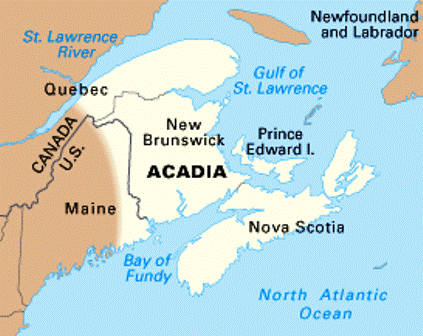
Before the Pilgrims landed on Plymouth Rock, Nova Scotia was settled by the French and called by them “Acadia”. During the early part of the 18th century there was a war between the English and French, won by the English in the Treaty of Utrecht in 1713. For more than forty years, the Acadians remained in quiet possession of their homesteads and were not subjected to taxation by the English.
However, a war arose in 1755 between England and France. In the process, the Acadians sympathized with the French and refused to swear allegiance to the British. But they agreed to remain neutral and were known as “French Neutrals”. Yet, they were thought of by the English as “spies in the camp”, hence, inactive enemies. Some of the Acadians, however, disguised as Indians, participated in the slaughter of English settlers. The English military once again required them to take the oath of allegiance, and they refused. Many of them took refuge in Canada where they suffered intolerable hardships.
The Virginia Settlement of Arcadians
Late in 1755, eleven hundred “French Neutrals” were landed in Hampton, Virginia. They had no means of support and were maintained for months at public expense. But there was opposition from the colonists. Governor Dinwiddie described the Acadians as “bigoted Papists, lazy, and of a contentious behavior.” The General Assembly of Virginia determined to ship the Acadians to England, at a cost to the colony of 5,000 PDS. The Hampton region became part of Elizabeth City in 1619, and was included in Elizabeth City County when it was formed in 1643. By 1680, the settlement was known as Hampton, and it was incorporated as a town in 1705 and became the seat of Elizabeth City County.
Ultimately, English authorities gave the residents an alternative — either abandon the country themselves, or transport the Acadian inhabitants. The latter course was employed, and as a result, the villages and farms were laid waste. More than six thousand men, women and children were driven on board ships and scattered among the English — from New Hampshire to Georgia! One group of Acadians reached the French settlement in Louisiana and their descendants today reside on the Gulf of Mexico.
Source: Annals of Augusta County Virginia by Joseph A. Waddell.